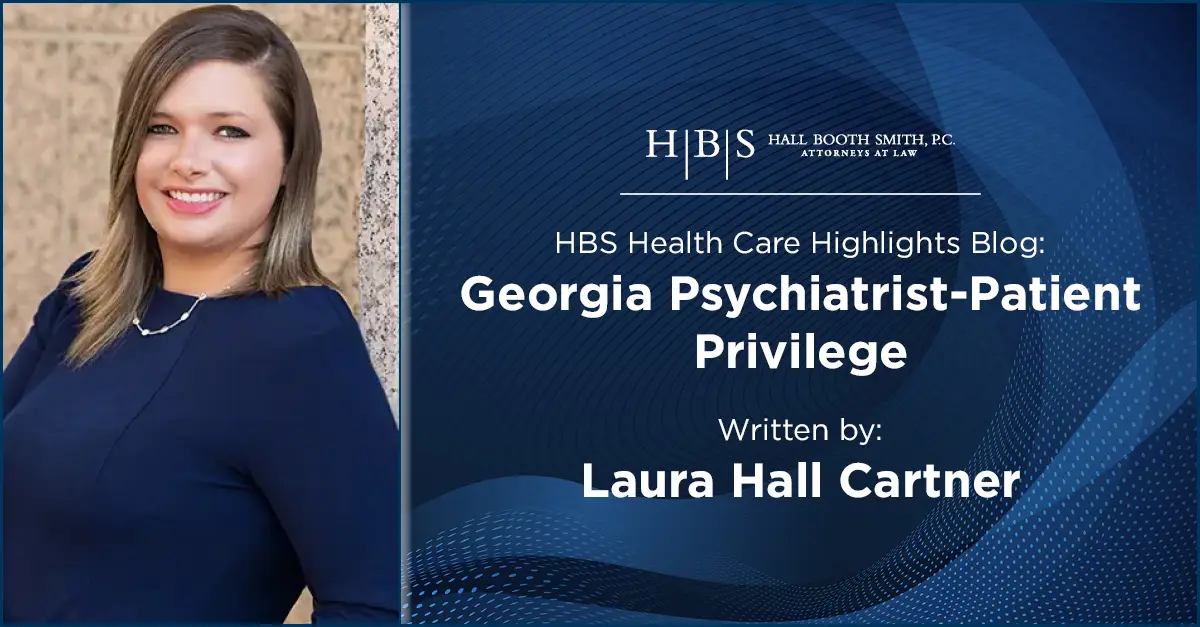
Georgia Psychiatrist-Patient Privilege
Overview
There are certain types of records in Georgia personal injury cases that are considered “privileged.” For example, there is the attorney-client privilege. Another important privilege is the psychiatrist-patient privilege or the mental health privilege. This privilege is contained in O.C.G.A. § 24-5-501, which states that communications between a psychiatrist, psychologist, or other mental health specialists and patients are privileged.
In Georgia, this has become an almost absolute privilege1 that may only be overcome by showing either that the patient expressly waived or that the patient’s decisive and unequivocal conduct created an intent to waive privilege (see Cooksey v. Landry, 295 Ga. 430, 433 (2014)). Unlike other recognized privileges in Georgia, the psychiatrist-patient privilege survives the death of a patient, meaning a deceased patient’s representative cannot waive the psychiatrist-patient privilege.
Specifically, O.C.G.A. § 31-33-4 provides that the statutes which authorize the release of health records to a deceased patient’s representative “shall not apply to psychiatric, psychological, or other mental health records of the patient” while O.C.G.A. § 37-3-166(a)(8.1) authorizes mental health facilities to release a deceased patients mental health records to the deceased patient’s representative only when not privileged under the laws of Georgia.
Purpose of Psychiatrist-Patient Privilege
The purpose behind the psychiatrist-patient privilege is to encourage the patient to talk freely without fear of disclosure and embarrassment, which in turn enables the psychiatrist to render effective treatment to the patient, as detailed in Advantage Behavioral Health Systems v. Cleveland. The privilege “remains inviolate even though the patient’s care and treatment or the nature or extent of the patient’s injuries are put in issue in a civil proceeding.”
Georgia case law holds that the mental health privilege applies, in the absence of a waiver by the patient, regardless of who raises the issue, whether it be an individual mental health professional, a mental health care facility, or another entity. Id. at 521. The privilege specifically applies to “communications” and “admissions” between patients and covered mental health providers, as well as, communications between covered mental health providers regarding patient communications. Id. at 524.
Additionally, the privilege also applies to “any information that the [mental health] professional holds which has its origins in” communications between the patient and the professional. Id.
Exceptions to Absolute Privilege
While the courts hold that the psychiatrist-patient privilege is almost an absolute privilege, the Georgia Court of Appeals recently held that not everything in a mental health record is privileged, as there is information in the record that it does not have its origins in patient-mental health professional communications. Id.
For example, the Georgia Court of Appeals held the following is not protected by the psychiatrist patient privilege: the fact of treatment; participation in certain activities, such as meeting with a social worker, attending group therapy, and watching television; or the dates on which treatment was rendered. Id. As such, the psychiatrist-patient privilege in Georgia is almost an absolute privilege, with very little information not being covered by the privilege in a mental health record, absent an explicit waiver from the patient, and is heavily protected by the Georgia courts.
Footnotes
- In Bobo v. State, the court held that the psychiatrist/patient privilege may be overcome if the party seeking to abrogate the privilege makes a sufficient showing that the evidence is necessary to his defense and otherwise unavailable to him. 256 Ga. 357 (1986). However, no cases since Bobo have presented the requisite level of necessity to permit the release of privileged mental health records without patient authorization, and Bobo has been limited by the Court of Appeals to criminal cases. Dynin v. Hall, 207 Ga. 337 (1993).
Disclaimer
This material is provided for informational purposes only. It is not intended to constitute legal advice nor does it create a client-lawyer relationship between Hall Booth Smith, P.C. and any recipient. Recipients should consult with counsel before taking any actions based on the information contained within this material. This material may be considered attorney advertising in some jurisdictions. Prior results do not guarantee a similar outcome.
Blog Overview
About the Author
Laura Hall Cartner
Partner | Atlanta Office
T: 404.586.6603
E: lhall@hallboothsmith.com
Laura Hall Cartner concentrates her practice in the health care industry, regularly representing providers including hospitals, skilled nursing facilities, assisted living facilities, and sub-acute facilities in all phases of litigation related to both general and professional liability claims.




Leave a comment
You must be logged in to post a comment.